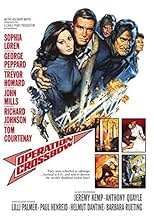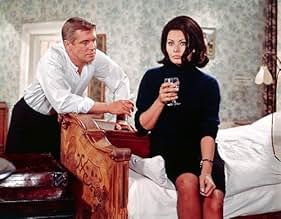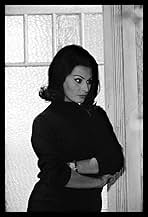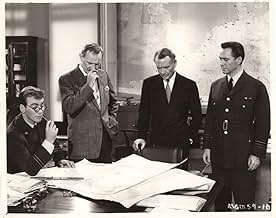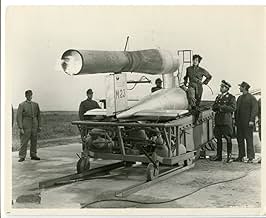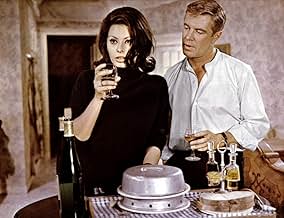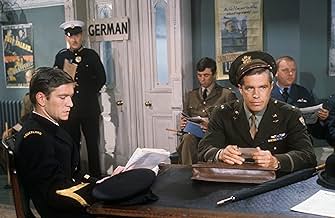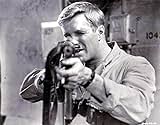PUNTUACIÓN EN IMDb
6,6/10
5,9 mil
TU PUNTUACIÓN
Los agentes aliados intentan infiltrarse en el sitio de investigación de cohetes de los nazis.Los agentes aliados intentan infiltrarse en el sitio de investigación de cohetes de los nazis.Los agentes aliados intentan infiltrarse en el sitio de investigación de cohetes de los nazis.
- Dirección
- Guión
- Reparto principal
- Premios
- 1 premio en total
Barbara Rütting
- Hannah Reitsch
- (as Barbara Rueting)
Reseñas destacadas
Excellent suspense movie. This one probably "disappeared among the "Guns of Navarone" imitators during the 60's. A pity, since it is worth having a look at. Some points in its favour: "Unpredictable" - characters who usually don't die in movies like this dies unexpectedly and in unexpected order (it doesn't follow the clichés). The spies sent on undercover missions into Germany are actually forced to speak German, and various ruses to cover up the accents have to be made. One negative aside though. At times it seems that two movies are being shown at the same time, a docu-drama about the actual bombings of England and a totally fictitious (albeit exciting) spy drama.
"Operation Crossbow" is a fictional movie based on historical events of World War II. It's a historical look at Hitler's program to develop rocket weapons and the Allied efforts to foil the Germans. The plot has enough intrigue and action to make the film entertaining. And, the bombing scenes keep the sense of urgency about the race between the Allies and the Germans the last two years that would determine the war's outcome.
The film has a cast of notable movie stars of the day; but I think only a couple stand out for their performances. Trevor Howard is excellent as Professor Lindemann, and Tom Courtenay is very good and convincing as Robert Henshaw.
The real pluses for this film are four. First, it's a reasonable portrayal of historical events and some key people of the time. Second, it has excellent camera work. Third, it has very good recreations of the German rockets and testing sites and of the bombing scenes in London and the air raids on the German sites. Fourth, it uses some actual war film footage sparingly.
During World War II, Operation Crossbow was the code name for the overall Allied effort to destroy the German rocket and long-range bombing projects. It began in early 1943, under the code name "Bodyline," when Allied planes photographed a V-2 rocket site in northern France. The code name changed that fall.
Some of the film characters are based on real people and use their names. Others are amalgams of people. The roles of the main stars aren't real people. Besides Winston Churchill, other British leaders portrayed were real. Richard Johnson plays Duncan Sandys who was in charge of Operation Crossbow. He had been wounded while fighting with British forces in Norway after Germany invaded that country in early 1940. He also was Churchill's son-in-law at the time.
In this movie, Sandys often is at odds with the chief science adviser to his group, Professor Lindemann. Frederick Lindemann was a real person and the chief science adviser to the British war effort. He was a close friend of Winston Churchill and made significant contributions to the Allied war efforts. But, he believed that the German rocket program was a hoax. Another leading scientific adviser was Reginald V. Jones with whom Sandys often clashed. It seems that the film writers combined the two British scientists under the character of Lindemann.
Constance Babington Smith, played by Sylvia Syms, was another very real person in the film. She was the British photo interpreter who first spotted a German rocket site from aerial photos. Another real character was Hanna Reitsch, played by Barbara Rutting. Reitsch was a renowned German aviatrix who set many flying records. She was a test pilot for the Nazis and was the only woman to receive the Iron Cross first class. She survived the war and set many glider records. Reitsch died at age 67 in August, 1979, at Frankfurt – then, West Germany.
MGM's British film group did an excellent job recreating the German Peenemünde rocket research and testing site. The filming was done along the Norfolk coast, NNE of London. Its North Sea location and coastline probably very closely resembled the real German site along the Baltic Sea.
Watching this film again, I understood how the British early on were concerned about Germany's advances in weapons. After the war, and through the 1950s, there was a general sense in the U.S. – and perhaps much of the world – that the Germans were generally superior in the fields of science and engineering. I grew up with that notion. My dad had served in the Army in Europe during WW II, and I later served in the Army in Germany during the Cold War. The Germans continued to excel in cameras, tape recorders, other electronic production and automobiles. But, with the passage of time and greater public awareness of recent history, we now know more about the seeming German prowess in the sciences.
In fact, most of technology and development of the German rocket program had been pioneered almost two decades before by an American scientist, Robert H. Goddard (1882-1945). Today, Goddard is recognized as the father of modern rocketry and the father of the space age. How ironic that when he died in 1945, many still doubted and dismissed him and his work. Yet, he had launched the world's first liquid-fueled rocket in March 1926; and he and his team had launched 34 rockets from then until 1941. He was working with grant monies and obtained more than 200 patents. But much of his work took place during the depression. And, no one – the U.S. government included, seemed interested in all the possibilities that Goddard had envisioned from rocket science and achievements.
My DVD of "Operation Crossbow" had a 10-minute short special with it, "A Look Back at Crossbow." It has some early film clips of Goddard's first attempts to launch rockets. One can see these today on YouTube. This short documentary noted that Germany collected all of the Goddard research achievements for a mere 10 cents per copy from the U.S. Patent Office. And, Adolf Hitler had his Nazi regime embark on a huge R&D program for weapons superiority shortly after he came to power in 1932. The rest is history.
Another American also had much to do with Japan's recovery after the war. W. Edwards Deming was a scientist whose work Japanese industry took seriously. In just two decades, Japan grew to become a world power based on its high quality and innovative production. Japan's industry created the Deming Prize in 1951. President Reagan awarded Deming the National Medal of Technology in 1987. But, just as with Robert Goddard, Deming's work wasn't widely recognized in the U.S. until after his death in 1993. And, that's another whole story.
The film has a cast of notable movie stars of the day; but I think only a couple stand out for their performances. Trevor Howard is excellent as Professor Lindemann, and Tom Courtenay is very good and convincing as Robert Henshaw.
The real pluses for this film are four. First, it's a reasonable portrayal of historical events and some key people of the time. Second, it has excellent camera work. Third, it has very good recreations of the German rockets and testing sites and of the bombing scenes in London and the air raids on the German sites. Fourth, it uses some actual war film footage sparingly.
During World War II, Operation Crossbow was the code name for the overall Allied effort to destroy the German rocket and long-range bombing projects. It began in early 1943, under the code name "Bodyline," when Allied planes photographed a V-2 rocket site in northern France. The code name changed that fall.
Some of the film characters are based on real people and use their names. Others are amalgams of people. The roles of the main stars aren't real people. Besides Winston Churchill, other British leaders portrayed were real. Richard Johnson plays Duncan Sandys who was in charge of Operation Crossbow. He had been wounded while fighting with British forces in Norway after Germany invaded that country in early 1940. He also was Churchill's son-in-law at the time.
In this movie, Sandys often is at odds with the chief science adviser to his group, Professor Lindemann. Frederick Lindemann was a real person and the chief science adviser to the British war effort. He was a close friend of Winston Churchill and made significant contributions to the Allied war efforts. But, he believed that the German rocket program was a hoax. Another leading scientific adviser was Reginald V. Jones with whom Sandys often clashed. It seems that the film writers combined the two British scientists under the character of Lindemann.
Constance Babington Smith, played by Sylvia Syms, was another very real person in the film. She was the British photo interpreter who first spotted a German rocket site from aerial photos. Another real character was Hanna Reitsch, played by Barbara Rutting. Reitsch was a renowned German aviatrix who set many flying records. She was a test pilot for the Nazis and was the only woman to receive the Iron Cross first class. She survived the war and set many glider records. Reitsch died at age 67 in August, 1979, at Frankfurt – then, West Germany.
MGM's British film group did an excellent job recreating the German Peenemünde rocket research and testing site. The filming was done along the Norfolk coast, NNE of London. Its North Sea location and coastline probably very closely resembled the real German site along the Baltic Sea.
Watching this film again, I understood how the British early on were concerned about Germany's advances in weapons. After the war, and through the 1950s, there was a general sense in the U.S. – and perhaps much of the world – that the Germans were generally superior in the fields of science and engineering. I grew up with that notion. My dad had served in the Army in Europe during WW II, and I later served in the Army in Germany during the Cold War. The Germans continued to excel in cameras, tape recorders, other electronic production and automobiles. But, with the passage of time and greater public awareness of recent history, we now know more about the seeming German prowess in the sciences.
In fact, most of technology and development of the German rocket program had been pioneered almost two decades before by an American scientist, Robert H. Goddard (1882-1945). Today, Goddard is recognized as the father of modern rocketry and the father of the space age. How ironic that when he died in 1945, many still doubted and dismissed him and his work. Yet, he had launched the world's first liquid-fueled rocket in March 1926; and he and his team had launched 34 rockets from then until 1941. He was working with grant monies and obtained more than 200 patents. But much of his work took place during the depression. And, no one – the U.S. government included, seemed interested in all the possibilities that Goddard had envisioned from rocket science and achievements.
My DVD of "Operation Crossbow" had a 10-minute short special with it, "A Look Back at Crossbow." It has some early film clips of Goddard's first attempts to launch rockets. One can see these today on YouTube. This short documentary noted that Germany collected all of the Goddard research achievements for a mere 10 cents per copy from the U.S. Patent Office. And, Adolf Hitler had his Nazi regime embark on a huge R&D program for weapons superiority shortly after he came to power in 1932. The rest is history.
Another American also had much to do with Japan's recovery after the war. W. Edwards Deming was a scientist whose work Japanese industry took seriously. In just two decades, Japan grew to become a world power based on its high quality and innovative production. Japan's industry created the Deming Prize in 1951. President Reagan awarded Deming the National Medal of Technology in 1987. But, just as with Robert Goddard, Deming's work wasn't widely recognized in the U.S. until after his death in 1993. And, that's another whole story.
In some ways an old-fashioned, star-studded, overstuffed "mission" movie, "Operation Crossbow" has, to me, an authentic WWII feeling to it. I'm guessing this movie's scenes and attitudes may have resonated with people in 1965 who'd lived through that period.
World War II was Big, and that's reflected here. The movie's individual characters are less important than the group war effort, something they're very aware of. And the nothing-personal killing of one character by a Resistance member, is pretty stunning. My hat is off to that.
Side note: During the '60s did Thomas Pynchon ("Gravity's Rainbow") go see this movie? He was then working on his big novel about the V-2 rocket. People have noodled about a possible cause-and-effect between movie and novel, including Dave Kehr in the NYTimes. FWIW, somewhere in "Gravity" I think there's a description of someone's wristwatch being worn on the inside of the wrist, "World War II style." (So the luminous hands wouldn't show during night operations??) That's the way George Peppard wears his watch.
World War II was Big, and that's reflected here. The movie's individual characters are less important than the group war effort, something they're very aware of. And the nothing-personal killing of one character by a Resistance member, is pretty stunning. My hat is off to that.
Side note: During the '60s did Thomas Pynchon ("Gravity's Rainbow") go see this movie? He was then working on his big novel about the V-2 rocket. People have noodled about a possible cause-and-effect between movie and novel, including Dave Kehr in the NYTimes. FWIW, somewhere in "Gravity" I think there's a description of someone's wristwatch being worn on the inside of the wrist, "World War II style." (So the luminous hands wouldn't show during night operations??) That's the way George Peppard wears his watch.
Operation Crossbow was a film I enjoyed a lot. I didn't think it was perfect, some scenes drag and you can tell that Trevor Howard is not entirely interested in his role. That aside, it is very well directed, is well made with great cinematography and editing and has a brooding Ron Goodwin score. The film is talky, that I agree, but the dialogue is very good and the story compelling with on the whole with tense suspense and atmosphere, intriguing subplots and a thrilling action-packed finale. The acting is fine, George Peppard is likable, and while Sophia Loren's appearance is brief it is one along with her shocking death that is memorable. Tom Courtenay and John Mills are also well cast. Overall, an impressive film. 8/10 Bethany Cox
After a pretty dull beginning, "Operation Crossbow" increases its tensions and becomes a fascinating action/adventure film set in WW2. A little-known representer of that genre, but not much inferior to "The Guns of Navarone". Lots of suspenseful moments and an interesting cast full of familiar faces.
¿Sabías que...?
- CuriosidadesHannah Reitsch (Barbara Rütting) was a real-life person. Reitsch was a German aviatrix, and at one time, Adolf Hitler's personal pilot. During the Battle of Berlin, Reitsch attempted to persuade Hitler to escape from the city in a small lightweight Fieseler Storch airplane.
- PifiasAlthough piloted V-1s were built, they were launched from aircraft, not ramps. None were ever used in combat. Hanna Reitsch flew one to establish why other pilots crashed them on landing. She found that the problem was caused by the aircraft's exceptionally high stall speed.
- Citas
Phil Bradley: The first rocket I built rose three feet into the ground. The second took off horizontally, went straight through a hen-house and killed 40 roosters.
Bradley's Interviewer: How very discouraging for you. What did you do after that?
Phil Bradley: Buried the roosters, sir.
- ConexionesEdited into Escuadrón Mosquito (1969)
Selecciones populares
Inicia sesión para calificar y añadir a tu lista para recibir recomendaciones personalizadas
- How long is Operation Crossbow?Con tecnología de Alexa
Detalles
- Fecha de lanzamiento
- Países de origen
- Idiomas
- Títulos en diferentes países
- Code Name: Operation Crossbow
- Localizaciones del rodaje
- RAF Abingdon Parachute School, Abingdon, Oxfordshire, Inglaterra, Reino Unido(Parachute training scenes)
- Empresa productora
- Ver más compañías en los créditos en IMDbPro
- Duración1 hora 55 minutos
- Relación de aspecto
- 2.35 : 1
Contribuir a esta página
Sugerir un cambio o añadir el contenido que falta

Principal laguna de datos
By what name was Operación Crossbow (1965) officially released in India in English?
Responde
